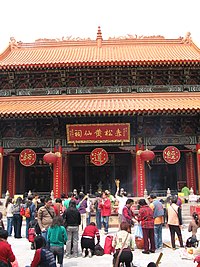Kau cim
| Kau cim | |||||||||||
 |
|||||||||||
| Traditional Chinese | / | ||||||||||
|---|---|---|---|---|---|---|---|---|---|---|---|
| Literal meaning | Request a stick or Beg a stick | ||||||||||
|
|||||||||||
| Transcriptions | |
|---|---|
| Standard Mandarin | |
| Hanyu Pinyin | qiu2 qian1 |
| Yue: Cantonese | |
| Jyutping | kau4 cim1 |
Kau Cim, Kau Chim or Lottery poetry is a fortune telling practice that originated in China in which the querent (person asking the question) requests answers from a sacred oracle lot. The practice is often performed in a Taoist or Buddhist temple in front of an altar. Kau Cim is often referred to as Chien Tung or Chinese Fortune Sticks by westerners. In the USA, a version has been sold since 1915 under the name Chi Chi Sticks. Kau Cim is also sometimes known as "The Oracle of Kuan Yin" in Buddhist traditions.
A German Werner Banck classify the content of 420 sets to 24 categories and 160 sub categories.
The practice of kau cim interpreting dates back to the Jin Dynasty, according to the Jade Box Records, an ancient Chinese book on date selection, written by the famous Daoist monk Xu Xun in the 3rd century. Despite the Cultural Revolution in mainland China during the 1960s and 1970s, lottery poetry still prevails today in temples of Taiwan, Hong-Kong and Macau. Most Taoism temples have lottery poetry to provide religious guidance for the believers.
The prediction begins with the cup storing a number of the sticks. After the querent has finished their devotions to the main deity, the querent purifies the cylinder by revolving it around the incense burner three times and mixing the sticks by hand. The querent kneels in prayer, holding the cup between their palms and asking their question to the deity, either aloud or by whispering. This part needs to be done decisively as one should not shift questions or hesitate on the question in the middle of the rite. The shaking of the cylinder, which is usually tipped slightly downward, results in at least one stick leaving the cylinder and being dropped onto the floor. In most cases, if multiple sticks leave the cylinder, those fortunes do not count and must be shaken again. Each stick, with its designated number, represents one answer.
When a single stick falls out, the number will correspond to one of the hundred written oracles with an answer on it. The writing on the piece of paper will provide an answer to the question. In most cases, to confirm the validity of the answer given by the deity, the querent will pick up and toss two jiaobei blocks. Each block is round on one side and flat on the other. A successful answer requires one flat and one round side to be facing up, a failed answer will result in two round sides facing up. Much emphasis is placed on denial when both sides flat are tossed; some legends say when this happens, the deities are laughing at the querent. The querent will have the option to ask for a fortune again until a successful answer can be made.
...
Wikipedia
